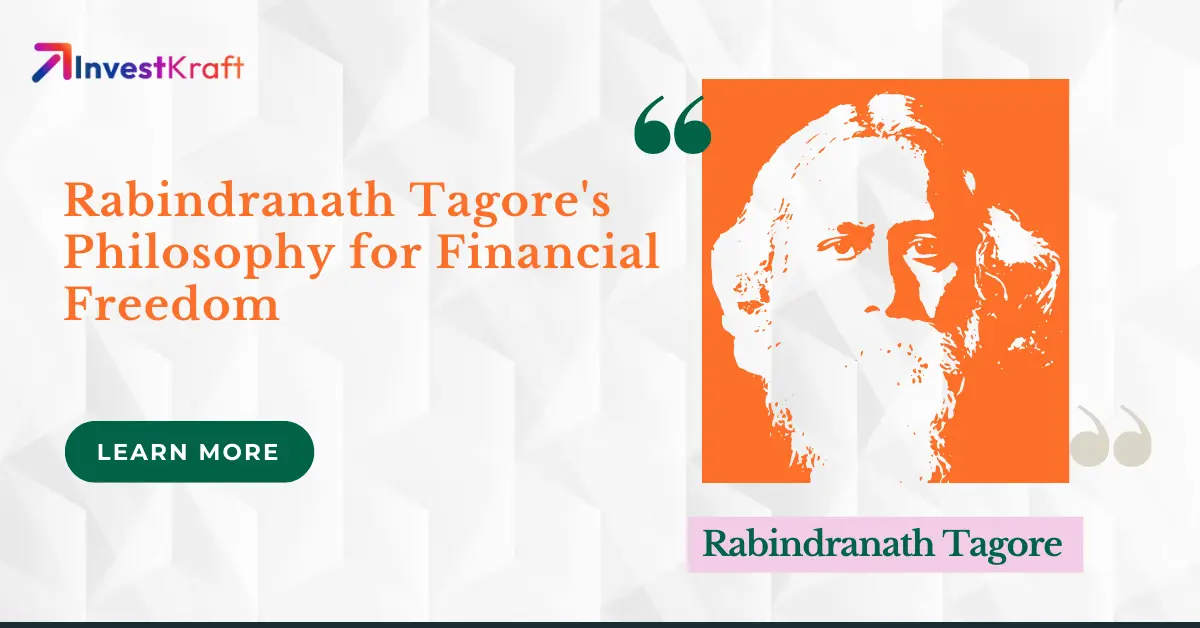Rabindranath Tagore’s Message for Financial Freedom to Break Free from Debt

Are you seeking a way out of financial hardship and yearning for freedom from debt? Consider the invaluable teachings of Rabindranath Tagore, the celebrated poet and philosopher who was awarded the Nobel Prize. Tagore, renowned for his profound wisdom, imparts practical advice to attain financial security and liberation from the weight of debt.
In this article, we will discuss Tagore’s philosophy of simple living and mindful consumption. We explore his ideas on detaching from material possessions and prioritizing experiences over extravagance to break free from debt to achieve financial well-being. Tagore’s message, originating over a century ago, remains relevant in today’s materialistic world, offering empowerment for a more fulfilling and financially liberated life.
Financial Freedom Starts with Living Within Your Means
Tagore’s advocacy for simple living aligns with the core principle of financial literacy - living within your means. He did not support extravagant displays of wealth and frequently critiqued materialism in his writings. This philosophy translates to responsibly managing income, steering clear of unnecessary debt and prioritizing needs over wants. By embracing mindful spending, individuals can allocate resources for financial security.
Patience is Key for Long-Term Investing
Tagore’s extensive artistic career demonstrates the value of taking a long-term approach, a concept that also applies to financial planning. His quote about being fearless in the face of dangers can be seen as promoting calculated risk-taking in investing. This aligns with the idea of prioritizing long-term growth and consistency in investment strategies despite market fluctuations. Ultimately, achieving financial success requires patience, discipline and a focus on long-term goals rather than short-term gains.
Diversify for Financial Wellbeing
Tagore believed in a well-rounded education that goes beyond one field, aligning with the concept of diversification in financial planning. Just as he advocated for exploring different avenues of knowledge, a diversified financial portfolio incorporates various asset classes to mitigate risk. Tagore’s quote, “The highest education is that which does not restrict us to any one profession or country”, emphasizes the importance of taking a versatile approach.
True Fulfilment Lies Beyond Material Wealth
Tagore’s perspective on the importance of experiences and human connection over material wealth is a valuable reminder in today’s society. It encourages us to prioritize personal enrichment and genuine connections alongside financial security. Achieving a balance between financial well-being and pursuing meaningful experiences is essential for a fulfilling life. By emphasizing the empowerment that comes with financial literacy, Tagore’s philosophy encourages us to focus on passions and a purposeful existence rather than just accumulating possessions.
Contentment and Avoiding Comparison
Tagore’s poetry emphasizes the importance of simplicity and warns against the pitfalls of greed. It suggests that true financial well-being is not solely dependent on wealth accumulation, but also on finding contentment with one’s current situation. By avoiding the tendency to compare oneself with others and cultivating gratitude, individuals can make wiser financial decisions and avoid unnecessary expenses.
Ethical Consumption and Responsible Investing
Tagore’s advocacy against exploitation extends to the financial realm by promoting conscious consumerism and responsible investment. This mindset urges individuals to support companies that uphold ethical practices and sustainable values, aligning financial decisions with personal beliefs.
The Importance of Giving Back
Tagore emphasized the connection between humanity and finances. He believed that financial literacy is important, not only for personal benefits but also for enabling individuals to contribute to the well-being of others. He recognized that even small acts of philanthropy can create a positive ripple effect in society.
Conclusion
Rabindranath Tagore’s wisdom provides valuable guidance for achieving financial freedom that is applicable across generations. His emphasis on simple living, mindful consumption and responsible financial planning remains relevant even in today’s fast-paced world. By adopting conscious spending, long-term investing and a diversified portfolio, individuals can attain financial security and liberate themselves from debt.
Immerse yourself in Tagore’s philosophy and set off on a path to financial independence and a more meaningful existence. Begin by delving into the material on thoughtful financial planning, sustainable investment approaches and socially responsible options. Keep in mind that financial freedom encompasses more than just accumulating riches. It entails finding inner tranquillity and cultivating a life abundant in purpose and memorable moments.
Frequently Asked Questions (FAQs)
Q: Did Tagore write extensively about personal finance?
A: No, Rabindranath Tagore did not write a formal treatise on personal finance. However, his life experiences, writings and educational philosophy point towards a deep understanding of financial responsibility and mindful living. His works reflect a holistic approach to life that encompasses both material and spiritual aspects. Despite the absence of a specific financial guide, Tagore’s philosophy offers valuable insights into managing personal finances and living a purposeful life.
Q: How is Tagore's philosophy relevant to financial literacy today?
A: Tagore's core principles of living simply, panning for a future and making informed decisions are still relevant today. Financial literacy plays a crucial role in helping people navigate complex financial products, manage debt responsibly and attain long-term financial security.
Q: Can you provide an example of how Tagore's ideas can be applied in modern finance?
A: Tagore's emphasis on mindful spending applies to today’s concept of mindful consumption. Modern financial planning promotes distinguishing between essential expenses and impulse purchases, just as Tagore advocated for prioritizing needs. Furthermore, Tagore’s emphasis on long-term planning aligns with the significance of starting investments early and utilizing compound interest to achieve financial goals.
Q: Was Tagore wealthy? Did his financial background influence his ideas?
A: Rabindranath Tagore’s upbringing in a wealthy Bengali family included inheriting a significant estate, but he also encountered financial challenges resulting from mismanagement and supporting extended family members. These experiences may have influenced his views on financial responsibility and the avoidance of excessive dependence on material possessions.
Q: Tagore is known for his educational philosophy. How does that connect to financial literacy?
A: Tagore’s holistic education philosophy emphasized the importance of developing practical life skills alongside intellectual pursuits. In line with this, promoting financial literacy can provide individuals with the tools to effectively manage their finances, ultimately empowering them to take control of their lives and pursue their aspirations.
Q: Tagore's ideas seem geared towards individuals. Is there a connection to financial empowerment in communities?
A: Absolutely. Tagore was not only a renowned poet and writer but also deeply committed to the upliftment of rural communities in India. He believed that financial literacy played a crucial role in this endeavour as it empowered individuals to manage money effectively and contributed to the overall development of communities. By promoting responsible borrowing practices fostering financial inclusion, financial literacy created a solid foundation for sustainable economic growth at the grassroots level.
Q: Tagore lived in a different era. Are his financial principles still relevant today?
A: The timeless core principles advocated by Tagore, such as living simply, planning for the future and making informed financial decisions, continue to hold value in the ever-evolving financial landscape. These principles serve as a solid foundation for effectively navigating modern finance, including budgeting, investing and managing debt.

Author: Abhik Das
Abhik Das is a versatile content writer with over 5 years of experience crafting engaging and informative content across diverse industries. His expertise spans the fields of ed-tech, pharmaceuticals, organic food, travel, sports, and finance.
Here's what sets Abhik apart:
Content Versatility: Able to adapt writing style and tone to suit various audiences and content needs.
SEO Proficiency: Creates content optimized for search engines, ensuring discoverability and organic traffic.
Deep Research: Conducts thorough research to ensure content accuracy and credibility across complex topics.
Engaging Storytelling: Captures reader interest with clear, concise, and compelling writing.
Abhik's diverse background empowers him to deliver insightful content across a wide range of subjects. Whether you're seeking engaging explainer pieces on the latest financial trends, informative guides to organic food choices, or captivating travelogues, Abhik has the expertise to craft content that resonates with your audience.





















